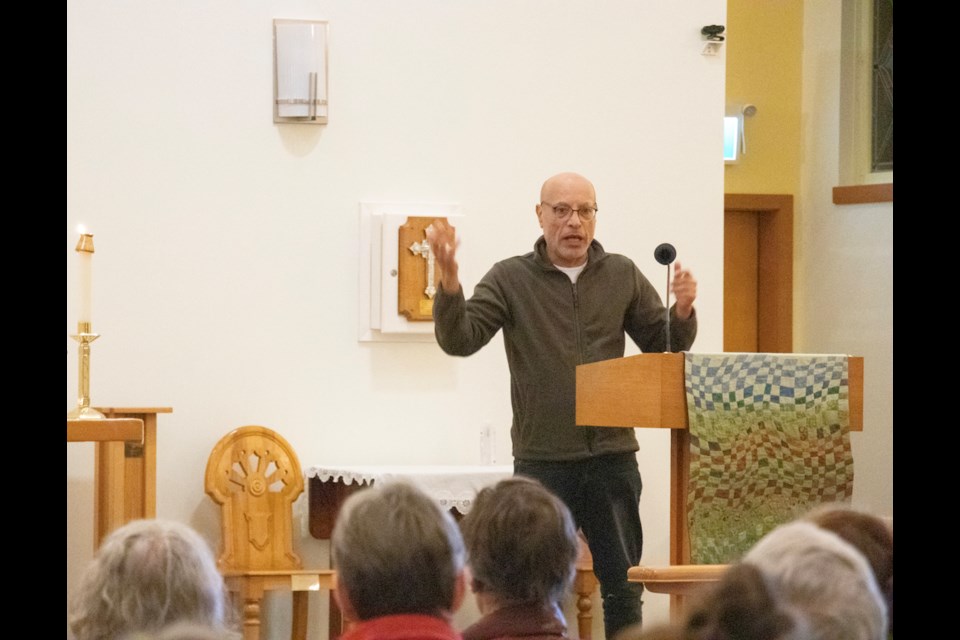The pews of St. Hilda's Anglican Church filled Tuesday evening for a lament for Palestine and Israel. The interfaith service blended speakers, prayer and song as the room grappled with the more than 20,000 deaths in the war in Gaza.
“In the biblical tradition, lament is not a time to try and figure out solutions for difficult problems, it is rather a time to honour our feelings of loss and grief,” Rev. Steve Black told the crowd in Sechelt, Feb. 6. “It is a time to listen and open our hearts to our own suffering and the suffering of others.”
Elders Monata and Sosop shared opening insights, highlighting the need to make sure everyone is equal, no matter who they are.
Music included contributions from Choralations children’s choir; A Capella Strait; Shadia Qubti, a Palestinian Israeli musician; and Jewish St. Hilda’s congregant Morrie Sacks who led the room in singing “Hine Ma Tov” (which he translated to, “How wonderful it is for brothers and sisters to congregate.”)
Nabil Abed, a Palestinian journalist recently from Gaza, who has family still there, gave insight into the on-the-ground situation, telling the service of the more than a million people now crowded into Rafah City, “Rafah is not a big city.” Abed told of spreading disease and lack of food – and what food there is, is expensive. The water, undrinkable. “You can say now, that Gaza has become uninhabitable, because most of the houses were destroyed.”
Abed told the story of a successful businesswoman – famous in Gaza City with a big house on the beach – who has lost everything. “She [stood] in line to wait for food,” Abed’s brother relayed to him.
The service also had the three “interfaith amigos” providing spiritual insights.
Richard Sewell, canon and dean at St. George’s Anglican Cathedral in Jerusalem offered a pre-recorded reflection and prayer. He told attendees of the “pain and fear and anxiety and distress” in the region. “We need bridges of understanding across these terrible divisions that we're experiencing,” he said, urging people avoid words of hatred and generalizations.
Rabbi and academic Laura Duhan Kaplan spoke of friends affected on all sides of the war, but of the need to not take rage and grief out on one another here in North America. “Maybe we want to say ‘ceasefire now,’ maybe we want to say, ‘return the hostages’ and then we find that these expressions of compassion and common sense have been turned into partisan slogans so that when we say them, others hear, ‘I have chosen a side and I don't give a damn about you,’ instead of a plain meaning of these words, which is, ‘I desire, life and wellbeing for all of us,’ and also, ‘We call on leadership to do what is it life-giving for people entrusted to their care.’”
Imam Jamal Rahman video conferenced in from Seattle, balancing the heavy topic matter with poignant humour and optimism as explored the question, “In the midst of all this mayhem, anger, pain, anguish, how can we contribute to peace?” And Rahman pointed to what he said Islam calls the “inner inconvenient work.” “At the heart of every single religion, we are invited, we are mandated – no matter what our religion, culture, race, nationality – is simply to become a more developed complete human being,” he said.
Rev. Dr. Joyce Parry Moore of St. Bartholomew’s Anglican Church in Gibsons closed out the service and led the attendees in “the prayer of three breaths,” following the heavy topic matter, “reminding ourselves that we are human beings with a body and not just heads on a broomstick.”
The entire service is available to watch on St. Hilda’s Facebook page.



